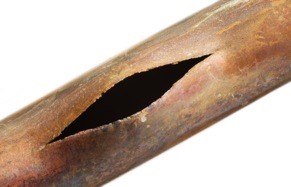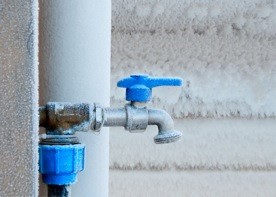Submitted by Springer Plumbing

As you prepare your wardrobe, car and home for the colder months ahead, don’t forget about your water system. When water freezes, it expands. If your pipes reach icy temperatures and the water in them freezes it can rupture the pipe, much like a can of soda left in the freezer for too long. The expense and inconvenience of frozen and damaged pipes is one we hope to help you avoid. Take the following precautions and your plumbing system should work well this winter.
Before the cold hits:
- Make sure your entire household knows where the main waterline shut-off valve is to the home. In the unfortunate event that you do have a burst pipe, the damage can be kept to a minimum by turning off the water supply to the home quickly.
- Insulate plumbing in unheated areas such as crawl spaces, garages, well houses and outdoors.
- Disconnect garden hoses before freezing temperatures arrive. We also recommend placing insulated faucet covers on your hose bibs. If you have dedicated shut-off valves for your outdoor faucets turn them off and drain the remaining water out of the line.
- Turn off and drain sprinkler systems.
- If you will be going away during cold weather, leave the thermostat set no lower than 55 degrees F.
During freezing weather:
- Make sure all rooms with plumbing fixtures, especially those with plumbing on outside walls, are heated.

Be especially cautious with exterior faucets and pipes on exterior walls during cold spells. - A bathroom or laundry room located next to a garage can be particularly susceptible to freezing, so keep the garage door closed to hold in heat.
- If your bathroom or kitchen pipes run along an exterior wall, keep the cabinet doors open to raise the temperature around your pipes as much as possible. Consider using a fan to help circulate the air near your pipes or turn on a small space heater.
- During extremely cold stints, keep a small trickle of water running at faucets. This eliminates pressure that can build between the faucet and any ice blockage as well as decrease the chance of water freezing in the first place.
- Do not try to thaw a frozen pipe with an open flame; as this will damage the pipe and could start a fire. You may be able to thaw a pipe with a hair dryer, start slowly at the faucet end of the pipe with the faucet open.
Have a warm winter and remember we are only a phone call or e-mail away if you need help with anything!




















































